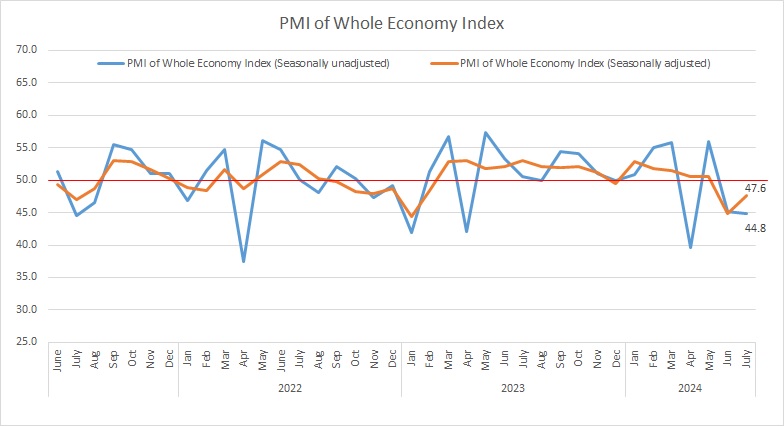Iran Chamber of Commerce, Industries, Mines, and Agriculture (ICCIMA) has released the country’s new PMI data for the fiscal month of Tir (June 21 – July 19, 2024) which is below the threshold for a second consecutive month.
The seasonally adjusted PMI was reported at 47.6, signaling a decrease in the Iranian economic activities although the drop has happened less sharply than the preceding month. The figure stood at 44.8 before the application of seasonal adjustment.
Seasonal adjustment, or deseasonalization, is a statistical method used to remove the seasonal component from a time series, allowing for the independent analysis of trends and cyclical deviations. After preparing dozens of PMI (Purchasing Managers' Index) reports, the Research Center of Iran Chamber of Commerce, Industries, Mines, and Agriculture has now identified the seasonal components of these time series and prioritized seasonal adjustment in its monthly PMI reports.
The PMI reading from the month under review registered its second lowest in 18 months, indicating that the Iranian businesses are not in good conditions.
The Statistics and Economic Analysis Center of Iran Chamber of Commerce, Industries, Mines and Agriculture, the sponsor and coordinator of the survey, announces the whole economy PMI data in a report every month.
The headline PMI is a number from 0 to 100, such that over 50 shows an expansion of the economy when compared with the previous month. A PMI reading under 50 indicates contraction and a reading of 50 implies no change.
PMI is an index of the prevailing direction of economic trends, aiming to provide information about business conditions to company directors, analysts and purchasing managers.

Click on the image for better view
The “business activities” sub-index (45.2) has registered one of its lowest although it has improved from 40.7 of the preceding month. Widespread electricity outages and falling financial resources are among the main factors contributing to this drop.
The “new orders” sub-index was on a downward trajectory for a third consecutive month to settle at 44.3. Orders from foreign customers have also been declining to register its lowest in the past three months, with the “exports of goods and services” sub-index being reported at 48.7.
The “raw material inventory” sub-index has also been reported at 49.7, a decline for a fifth month in a row which has been largely attributed to financial restrictions and failure to allocate enough currency to imports of raw materials.
The “employment” sub-index (48.9) has increased with a sharper slope compared to that of the preceding month to register an 11-month low. In a situation that the costs of living are not consistent with the rises in salaries, the Iranian workforce are not willing to continue to work for companies.
The “sales of goods and services” was also reported at 48.9, which continues to fall for a third month in a row due to falling demands from domestic and foreign customers driven by fluctuation of prices and politico-economic conditions at home.
|
INDEX
|
Ordibehesht1403 (Apr-May2024)
|
Khordad1403 (May-June2024)
|
Tir1403 (June-July2024)
|
|
PMI (seasonally adjusted)
|
50.7
|
44.9
|
47.6
|
|
business activities
|
50.4
|
40.7
|
45.2
|
|
new orders
|
46.8
|
42.1
|
44.3
|
|
suppliers’ delivery time
|
57.6
|
49.5
|
52.8
|
|
raw material inventory
|
47.5
|
45.6
|
49.7
|
|
employment
|
53.1
|
50.5
|
48.9
|
|
raw materials price
|
65.4
|
65.3
|
69.0
|
|
finished goods inventory
|
52.6
|
46.2
|
54.1
|
|
exports of goods and services
|
49.4
|
43.2
|
48.7
|
|
price of goods and services
|
55.0
|
52.9
|
55.3
|
|
consumption of energy carriers
|
49.5
|
51.1
|
56.1
|
|
sales of goods and services
|
48.9
|
43.7
|
48.9
|
|
expectations for next month economic activities
|
64.4
|
59.1
|
59.3
|